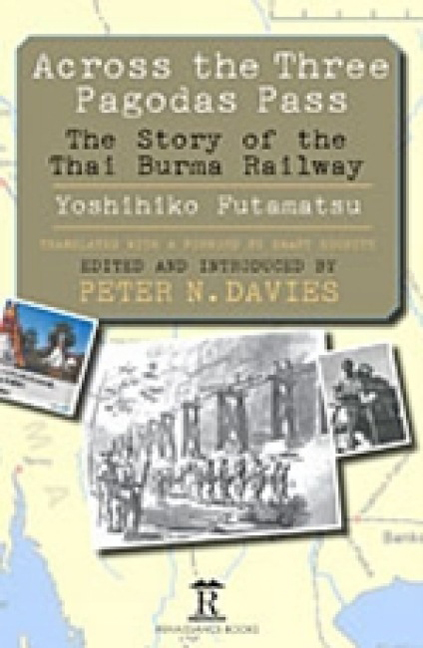Book contents
- Frontmatter
- Dedication
- Contents
- Acknowledgements
- Foreword
- Introduction
- Across the Three Pagodas Pass
- Translator’s Acknowledgements
- Preface
- Chapter 1 Departure for the Front
- Chapter 2 In Indo-China
- Chapter 3 Opening of Hostilities
- Chapter 4 The River Krian
- Chapter 5 The Malayan Campaign
- Chapter 6 The Fall of Singapore
- Chapter 7 Surrender
- Chapter 8 Shōnan: Light of the South
- Chapter 9 The Thai-Burma Railway
- Chapter 10 Preparing Construction
- Chapter 11 Banpong
- Chapter 12 Prisoners-of-War
- Chapter 13 Constructing the Railway
- Chapter 14 Thailand
- Chapter 15 The River Kwae Noi
- Chapter 16 The Mae Khlaung Bridge
- Chapter 17 Kanchanaburi
- Chapter 18 The Jungle
- Chapter 19 From Bangkok to Singapore
- Chapter 20 Rush Construction
- Chapter 21 The Base at Wanyai
- Chapter 22 The Labour Force
- Chapter 23 Survey Unit
- Chapter 24 Test Run
- Chapter 25 Bridge-Building and Shifting Earth
- Chapter 26 The Rainy Season: The Monsoon
- Chapter 27 Kinsaiyok
- Chapter 28 Diseases and Epidemics
- Chapter 29 Cattle Drive
- Chapter 30 Living in the Jungle
- Chapter 31 Soon to the Three Pagodas Pass
- Chapter 32 Towards the Setting Sun
- Chapter 33 Opening to Traffic
- Chapter 34 The Bombing
- Chapter 35 End of the War
- Chapter 36 Internment
- Chapter 37 Repatriation
- Footnote
- Postscript
- End Notes
- Glossary
- Bibliography
- Index
Chapter 14 - Thailand
Published online by Cambridge University Press: 13 May 2022
- Frontmatter
- Dedication
- Contents
- Acknowledgements
- Foreword
- Introduction
- Across the Three Pagodas Pass
- Translator’s Acknowledgements
- Preface
- Chapter 1 Departure for the Front
- Chapter 2 In Indo-China
- Chapter 3 Opening of Hostilities
- Chapter 4 The River Krian
- Chapter 5 The Malayan Campaign
- Chapter 6 The Fall of Singapore
- Chapter 7 Surrender
- Chapter 8 Shōnan: Light of the South
- Chapter 9 The Thai-Burma Railway
- Chapter 10 Preparing Construction
- Chapter 11 Banpong
- Chapter 12 Prisoners-of-War
- Chapter 13 Constructing the Railway
- Chapter 14 Thailand
- Chapter 15 The River Kwae Noi
- Chapter 16 The Mae Khlaung Bridge
- Chapter 17 Kanchanaburi
- Chapter 18 The Jungle
- Chapter 19 From Bangkok to Singapore
- Chapter 20 Rush Construction
- Chapter 21 The Base at Wanyai
- Chapter 22 The Labour Force
- Chapter 23 Survey Unit
- Chapter 24 Test Run
- Chapter 25 Bridge-Building and Shifting Earth
- Chapter 26 The Rainy Season: The Monsoon
- Chapter 27 Kinsaiyok
- Chapter 28 Diseases and Epidemics
- Chapter 29 Cattle Drive
- Chapter 30 Living in the Jungle
- Chapter 31 Soon to the Three Pagodas Pass
- Chapter 32 Towards the Setting Sun
- Chapter 33 Opening to Traffic
- Chapter 34 The Bombing
- Chapter 35 End of the War
- Chapter 36 Internment
- Chapter 37 Repatriation
- Footnote
- Postscript
- End Notes
- Glossary
- Bibliography
- Index
Summary
In those days in 1942 Thailand was a constitutionally-based monarchy with a king over the government. In ancient times this country was called Jamu and was a Burmese colony. In Japanese literature the character tai (Thai) was used but Thai in Siamese was a contraction of Pratet Thai which means ‘Thai monarch’. At the start of the Second World War, Prime Minister Phibun's pro-British party held the reins of government. For strategic reasons Japan had to demand transit over Thai soil. On the Cambodian border her Army watched its chance and made increasingly threatening demands for transit. Prime Minister Phibun quickly agreed to cooperate with the Japanese Army, and consequently with the start of hostilities a switch from the British to the Japanese side became urgent and advantageous to Thailand. However, this provided a superficial change and in 1945, with the war turning to Japan's disadvantage, she changed back in the end to a pro-British diplomatic stance. In South-East Asia at the time I think it would not have helped her to stay as she was, a nation which had yet to establish her standing in the world.
In the Spring of 1942, when the Thai-Burma Railway was begun, this country co-operated on the construction. The Japanese Army in its prosecution of the war found no obstacles in the way of its military transportation, co-operating with Thai National Railways. Between Banpong and Kanchanaburi the building of the roadbed, and between Kanchanaburi and Wanyai the re-modelling of the highway on Thai-side were planned to be apportioned out with the Thai, but the plan did not work out. It seems that the prisoners-of-war received intelligence from England itself, and from the outside world they had reports from a pro-British organization's secret manoeuvres, and beginning in 1945 the targets for bombing in the Kanchanaburi area were indicated by partisans. It seemed evident that Japan had no friends.
The Thai usually brag about their country's superiority, their feelings run high, their manner is that of being sticklers for prestige. In weighing up the pros and cons of their behaviour one must record that the educational standards of some of their officials were high but the practice of bribery among them persisted.
- Type
- Chapter
- Information
- Across the Three Pagodas PassThe Story of the Thai-Burma Railway, pp. 64 - 66Publisher: Amsterdam University PressPrint publication year: 2013



